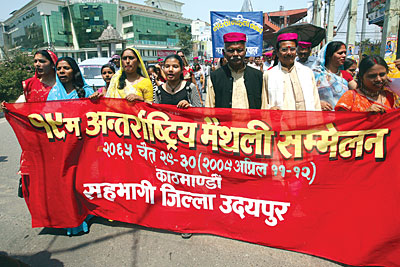 KIRAN PANDAY |
SUGA. This is a village where everyone speaks Maithili. But in the official records, Nepali figures as the mother tongue of a sizable section of the local population. One of the enumerators of the last census in 2001 explained the reason behind the anomaly: trainers had instructed them to fill in 'Nepali' in the mother tongue column unless respondents specified a different language of their own accord.
This was an innocent instruction for places like Ilam, Itahari, Chandranigahpur, Chitwan, Butwal, Kohalapur or Attaria along the East-West Highway. In the central Tarai, this technique to expedite data collection put an avoidable question mark over census figures. By the time some conscientious data supervisors spotted the error, part of the information had already been processed. Now, there is a concerted campaign underway to convert Maithili speakers from poor and marginalised sections of society into proponents of Hindi.
Since almost every educated person from earlier generations read and wrote in Hindi, it has been the language of status-seekers for a long time. It wasn't just the Badahakims of the Rana era, even the Anchaladhishes of the Panchayat period conversed in Hindi with the landed gentry. Since Marwaris and Banias dominated the local trade, Hindi established itself as the dominant language of the bajar.
The Nepali language challenged Hindi's status in the early seventies when schools were nationalised and it became the sole medium of education. By the early eighties, the three competing languages had carved out their respective domains: we spoke Maithili at home, Hindi in the bajar and Nepali at school and in government offices. English is still a distant fourth, its use limited to conversations with occasional foreign visitors.
When Nepali remained the language of the state even after the restoration of multiparty democracy in the 1990s, many upwardly mobile Madhesis began to use the national language even at home. Almost every prominent Madhesi politician today is the product of a system that promoted the necessity of a single language for national unity.
Sadbhavana Party was the first political force to propound the theory that Hindi was the link language of the Tarai and its language of conversation with the ruling class in Kathmandu. The logic failed to find favour with language activists at the grassroots who perceived Hindi to be a greater threat than Nepali to the existence of their mother tongues. The Madhes Uprising changed the equation as Hindi emerged as a homogenising tool of mass mobilisation in the Tarai.
Two astute Maithili-speaking politicians have responded in different ways. President Ram Baran Yadav opted for the state language. VP Parmananda Jha preferred the language of the bajar. Nurtured in a similar culture of linguistic uniformity, neither saw any merit in promoting their mother tongue. No wonder neither is seen as an icon of Maithili pride.
President Yadav probably has more admirers among Pahadis than Madhesis. Politically, he broke no new ground. However, because of the controversy his oath-taking ceremony generated, VP Jha has enlarged the space for the politics of language. Unfortunately, the victim of these seemingly opposite stands is once again the language of the masses in the Madhes.
Sardar Ram Mani Acharya Dixit was a pioneering Pundit who led the movement for the institutionalisation of Gorkhali as the state language. He inspired its transformation into the lingua franca of Nepalis over the world. In his autobiography Purana Samjhana, Sardar Ram Mani reminisced that the resilience of languages like Marathi and Maithili in resisting the rising tide of Hindi motivated him to work tirelessly for the promotion of Nepali. His soul must be wondering at the behaviour of two of the most powerful Maithili speakers of Nepal.
But it seems that the allure of the state is stronger than that of the market in poor countries. Of the six daily newspapers published from Janakpur, none is in Hindi. And the language of the only weekly newspaper published from this village? You guessed it - Nepali.



